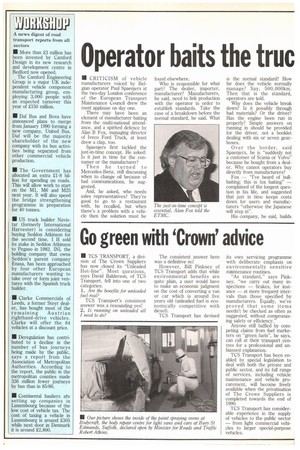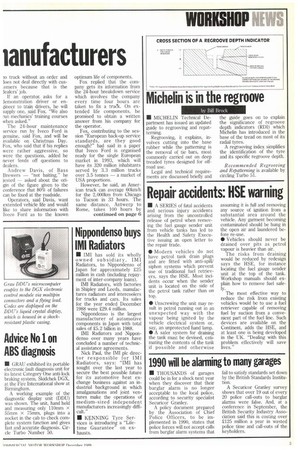Operator baits the truc
Page 116

Page 117

If you've noticed an error in this article please click here to report it so we can fix it.
ianufacturers
• CRITICISM of vehicle manufacturers voiced by Belgian operator Paul Spaenjers at the two-day London conference of the European Transport Maintenance Council drew the most applause on day one.
There may have been an element of manufacturer baiting from the multi-national attendance, and a spirited defence by Alan B Fox, managing director of Iveco Ford Truck, at least drew a clap, too.
Spaenjers first tackled the just-in-time concept. He asked: Is it just in time for the consumer or the manufacturer?
Then he turned to Mercedes-Benz, still discussing when to change oil because of bad communications, he suggested.
And, he asked, who needs sales representatives? They're good to go to a restaurant with, he recalled, but when there's a problem with a vehicle then the solution must be found elsewhere.
Who is responsible for what part? The dealer, importer, manufacturer? Manufacturers, he said, need to link production with the operator in order to establish standards. Take the case of a breakdown before the normal standard, he said. What is the normal standard? How far does the vehicle normally manage? Say, 500,000km. Then that is the standard, operators are told.
Why does the vehicle break down? Is it possibly through bad materials? Or the driver? Has the engine been run in properly? Simple answers on running in should be provided for the driver, not a booklet dealing with six or seven gearboxes.
Over the border, said Spaenjers, he is "suddenly not a customer of Scania or Volvo" because he bought from a dealer. Why cannot operators buy directly from manufacturers?
Fox — "I've heard of bullbaiting; this is fox baiting" — complained of the longest question in his life, and suggested that just in time keeps costs down for users and manufacturers "otherwise the Japanese will step in".
His company, he said, builds ao truck without an order and loes not deal directly with cus.orners because that is the lealers' job.
If an operatm asks for a iemonstration driver or engineer to train drivers, he will supply one, said Fox. "We also :-un mechanics' training courses when asked."
The 24-hour maintenance service run by Iveco Ford is genuine, said Fox, and will be available on Christmas Day. Fox, who said that if his replies were rather aggressive, so were the questions, added he never fends off questions to dealers.
Andrew Davis, of Bass Brewers — "not baiting," he jested — asked about the origin of the figure given to the conference that 80% of failures can be fixed at the roadside.
Operators, said Davis, want extended vehicle life and would like to share information with Iveco Ford as to the known optimum life of components.
Fox replied that the company gets its information from the 24-hour breakdown service which involves the company every time four hours are taken to fix a truck. On extended life components, he promised to obtain a written answer from his company for the operator.
Fox, contributing to the session "European back-up service standards, are they good enough?" had said in a paper that Iveco Ford is organised ready for the single European market in 1993, which will have its 320 million inhabitants served by 3.3 million trucks over 3.5 tonnes — a market of USA proportions.
However, he said, an American truck can average 60km/h for the 2,000km from Chicago to Tucson in 33 hours. The same distance, Antwerp to Rome, takes 100 hours by




















































































































































